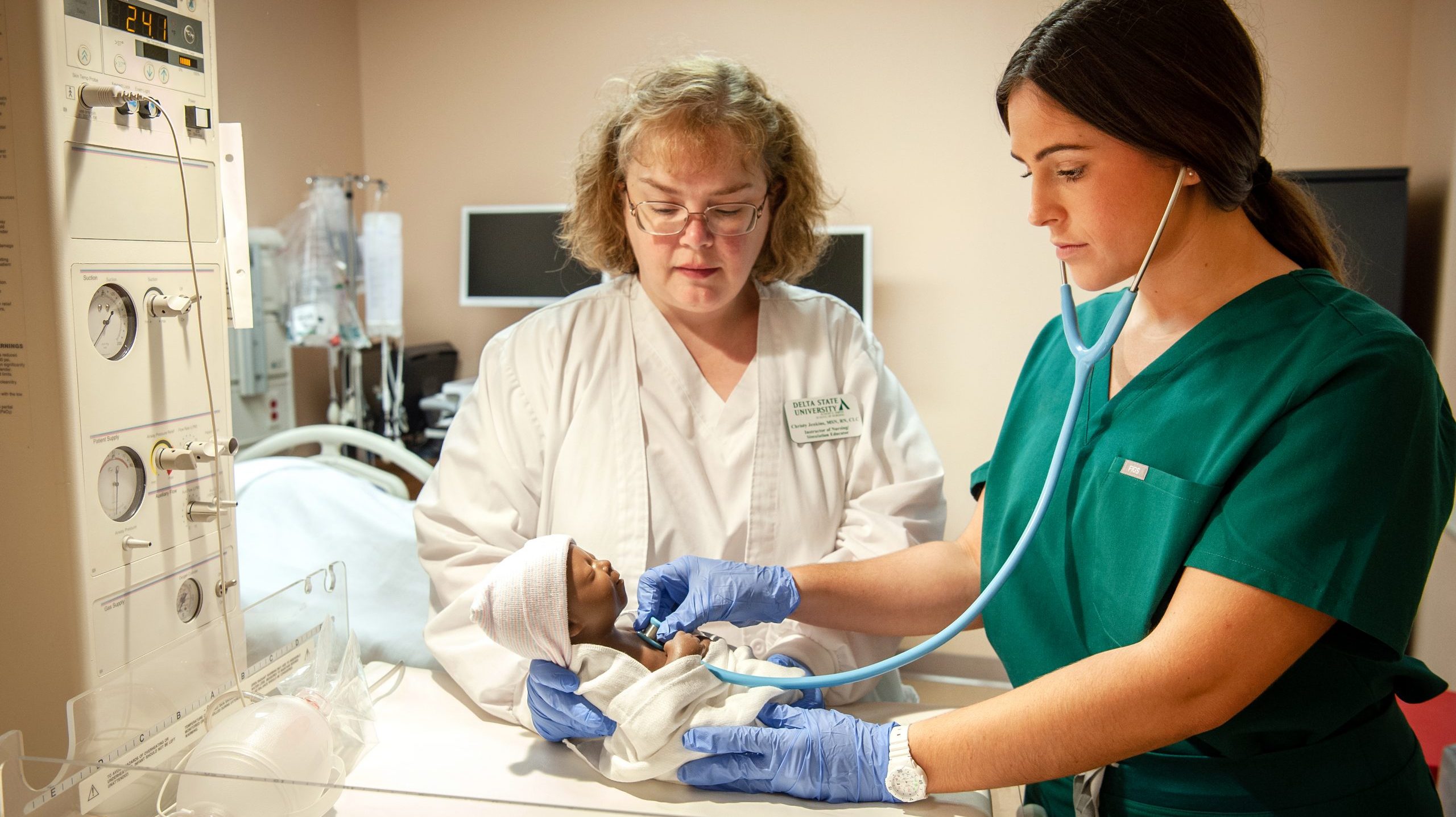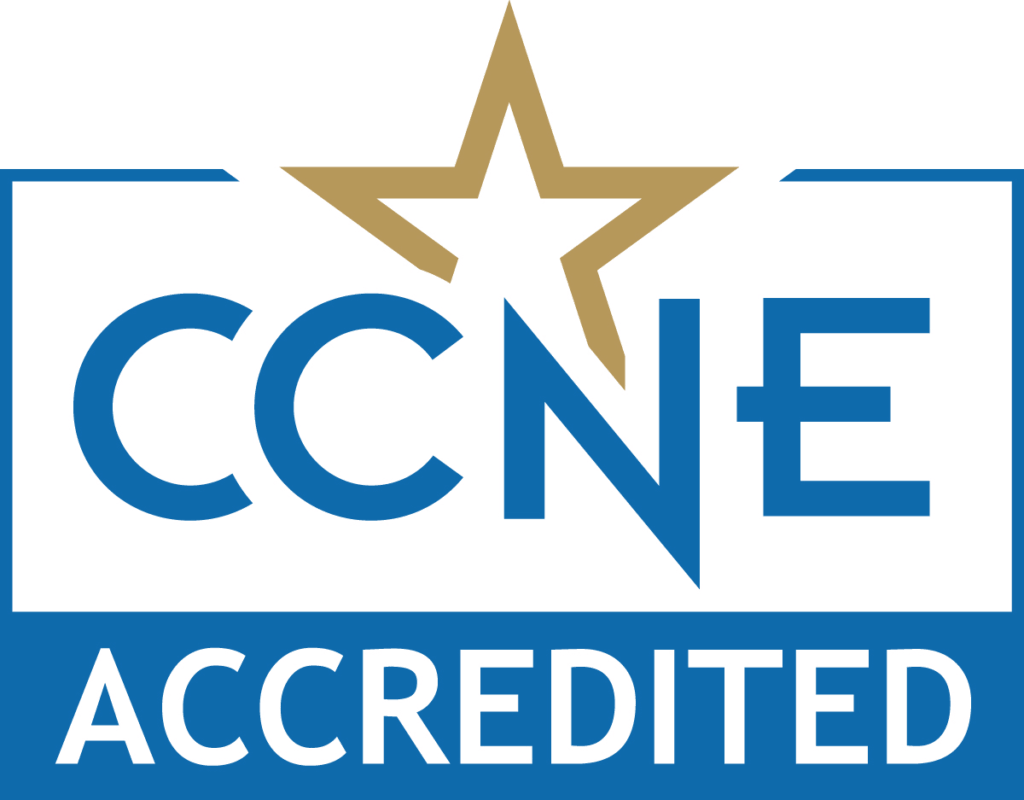Delta State University’s Bachelor of Science in Nursing (BSN) pre-licensure program at the Robert E. Smith School of Nursing and Health Sciences is for students who are not yet registered nurses. Graduates of this program are prepared to obtain a licensure as a registered nurse by taking the National Council of Licensure Exam (NCLEX). They will have the tools necessary to function as a competent and professional registered nurse in the delivery of nursing care and to pursue education beyond the baccalaureate level, if so desired.
This program is web-enhanced, which means that it is delivered face-to-face with some assignments/activities administered online. Students may choose to attend full-time or part-time. The full-time program of study can be completed in five semesters and the part-time program of study in seven semesters. Students who are seeking to earn the BSN but are already registered nurses should choose the RN-to-BSN program.
NCLEX Pass Rate for 2023
(Overall three year NCLEX pass rate of 100%)
Employment Rate for 2023
Graduation Rate for 2023
Why Choose Nursing at DSU?

The nursing faculty members have expertise in various nursing specialties and are committed to providing a high-quality education in the classroom, online, and in the clinical environment. In addition to participating in clinical practice at many of the surrounding healthcare agencies, faculty members integrate simulation into the teaching/learning process to explain nursing concepts and care for diverse individuals and populations. Students earn certifications in Advanced Cardiac Life Support (ACLS), Pediatric Advanced Life Support (PALS), Neonatal Resuscitation Program (NRP), and Tuberculosis Training. Visit our campus and schedule a tour of the Robert E. Smith School of Nursing and Health Sciences by contacting us or the Delta State University Admissions office.
- Applications accepted year round
- Students enroll in the program during the fall term
- Full-time and part-time options available
- Student advisement available online
- Individual learning opportunities
- Hands-on client care situations
- Simulation Lab with mannequins, supplies, and equipment
- Face-to-face skills checkoff with faculty feedback
- An interactive learning environment
- CCNE accredited

The Bachelor of Science in Nursing at Delta State University is accredited by the Commission on Collegiate Nursing Education, 655 K Street NW, Suite 750, Washington, DC 20001, 202-887-6791.

”I chose to pursue a nursing degree at Delta State University Robert E. Smith School of Nursing because of the nursing program’s positive reputation, the warm invitation from the faculty and staff during my tour of the university, and family roots in the community.
Celeiah Quin, BSN majorClass of 2023
What Can I Do With a Bachelor’s Degree in Nursing?
Nursing is a profession that offers more career choices than ever before in locations throughout the country. There is a nursing career option in almost every type of work environment: hospital, clinic, academic, industrial, administrative, laboratory, government, military, aviation, computer, sports, etc. Here are just a few of those choices:
- Critical Care Nurse
- Emergency Room Nurse
- Flight Nurse
- Home Care Nurse
- Industry Nurse
- Infection Control Nurse
- Medical-Surgical Nurse
- Pediatric Nurse
- OR/Recovery Nurse
- Psychiatric-Mental Health Nurse
- Obstetric Nurse
- Oncology Nurse
- School Nurse
Nursing Scholarships
Delta State’s BSN degree program is more affordable than many of its contemporaries offering similar opportunities. At DSU, we’re going to automatically consider you for scholarships. Some scholarships you may be considered for include opportunities for nursing majors, students with a GPA of 2.5 or higher, residents of Mississippi, students who plan to work in the state of Mississippi post-graduation, minorities, and more. Students may also be eligible for non-program specific scholarship opportunities.
Program Goals
Our team of faculty and staff members work to ensure that our students are prepared to meet employment needs of healthcare agencies. The program goals for Bachelor of Science in Nursing are to:
- Prepare graduates to obtain licensure as a Registered Nurse.
- Prepare graduates to competently and professionally deliver nursing care.
- Prepare graduates to pursue education beyond the baccalaureate level.

Student Learning Outcomes
Students can expect to achieve specific outcomes from the program. These outcomes combine to ensure that the student is qualified to meet professional standards of nursing care.
- Integrate knowledge from nursing, liberal arts, and natural and social sciences into professional nursing practice.
- Utilize the nursing process and standards of care to deliver safe, comprehensive nursing care to diverse clients in a collaborative environment.
- Practice as a self-directed nursing leader who is accountable to self, society, and the evolving nursing profession.
- Integrate research and evidence-based practice in the delivery of comprehensive nursing care.
- Utilize knowledge of professional and political processes to improve patient-care outcomes through leadership and advocacy.
- Provide person-centered care that focuses on health promotion and disease and injury prevention.
- Apply information and technology to improve healthcare delivery from an interdisciplinary approach.
Admission Requirements
Qualified students are admitted to the school each fall semester. Admission is competitive.
- Apply to Delta State University and meet undergraduate admission requirements as outlined.
- Achieve an ACT composite score of 21 or higher with overall GPA of 2.0 OR an ACT composite score of 18 – 20 with an overall GPA of 2.5.
- Make a grade of “C” or better in all non-nursing (pre-requisite) support courses. Any course receiving a score less than a “C” may be repeated only once to remain competitive in admission selection process.
- Submit the following information to the Robert E. Smith School of Nursing by March 1 prior to the first semester in which nursing courses begin.
-
- Robert E. Smith School of Nursing Baccalaureate Program application.
- American College Test (ACT) score.
- Transcripts from all colleges and universities attended. A student entering the Robert E. Smith School of Nursing wanting to receive credit for prior nursing course(s) from another program must submit a request and credit be negotiated before admission to the Robert E. Smith School of Nursing and not after the student is enrolled.
- Progress report of academic standing for any required courses in progress at date of application.
**Exceptions to the noted admission requirements may be considered by the Undergraduate Nursing Program Committee.
- All students must comply with Mississippi Legislative statutes and regulations regarding criminal background checks by having fingerprints taken and a criminal background check completed. Any cost of this requirement will be the student’s responsibility.
- After being accepted for admission, each student will be required to submit a completed health and immunization form provided by the Robert E. Smith School of Nursing, evidence of personal health insurance, and Basic Life Support (BLS) for healthcare providers.
Curriculum
The courses below are required to complete the BSN as a full-time or part-time student. The BSN also requires non-nursing (pre-requisite) support courses, which must be passed with a “C” or better. Review the undergraduate academic catalog for more information and details.
Non-Nursing (pre-requisite) Support Courses
| Courses | Credit Hours |
| BIO 230 Anatomy and Physiology | 4 |
| BIO 231 Anatomy and Physiology | 4 |
| BIO 217 Microbiology | 4 |
| CIS 205 Microcomputer Applications | 3 |
| COM 101 Public Speaking | 3 |
| ENG 101 English Composition | 3 |
| ENG 102 English Composition | 3 |
| FCS 345 Nutrition | 3 |
| Fine Arts Elective (ART 101, 212, 401, 402; MUS 114, 115, 116, 117) | 3 |
| History Elective (101, 102, 103, 104, 201, 202) | 3 |
| Human Dev./Behavioral Sci. Elective (PSY 307, 313, 403; FCS 326; CEL 300) | 3 |
| Literature (ENG 201, 203, 205, 206, or other approved Literature) | 3 |
| MAT 103 Quantitative Reasoning or *MAT 104 College Algebra (required for DSU) | 3 |
| PSY 101 General Psychology | 3 |
| SOC 101 Principles of Sociology | 3 |
| Humanities Elective (Additional Fine Art Elective; Additional History; Additional Literature; or Introduction to Philosophy) | 3 |
| Statistics (MAT 115, MAT 300, PSY 331) | 3 |
| BIO 100 General Biology 1 (Prerequisite for BIO 230, 231, 217 at Delta State) | 4 |
| CHE 101 and CHE 103 (Prerequisite for BIO 230, 231, and 217 at Delta State) | 4 |
BSN, Plan of Study – Full-time
Junior 1 – Fall Semester
| Course Number | Course Title | Credits |
| NUR 302 | Fundamentals of Client Care | 3 |
| NUR 332 | Fundamentals of Client Care Practicum | 3 |
| NUR 303 | Health Assessment | 3 |
| NUR 333 | Health Assessment Practicum | 1 |
| NUR 312 | Basic Pathophysiology | 3 |
| TOTAL | 13 | |
Junior 2 – Spring Semester
| Course Number | Course Title | Credits |
| NUR 304 | Pharmacology | 3 |
| NUR 305 | Nursing the Adult Client I | 4 |
| NUR 335 | Nursing the Adult Client I Practicum | 3 |
| NUR 314 | Health Policy & Ethical Decision Making | 2 |
| NUR 320 | Nursing Informatics | 2 |
| TOTAL | 14 | |
Junior 3 – Fall Semester
| Course Number | Course Title | Credits |
| NUR 306 | Nursing the Adult Client II | 4 |
| NUR 336 | Nursing the Adult Client II Practicum | 3 |
| NUR 307 | Mental Health/Psychiatric Nursing | 3 |
| NUR 337 | Mental Health/Psychiatric Nursing Practicum | 1 |
| NUR 309 | Nursing Research/Evidence Based Practice | 3 |
| TOTAL | 14 | |
Senior 1 – Spring Semester
| Course Number | Course Title | Credits |
| NUR 401 | Maternity Nursing | 2.5 |
| NUR 441 | Maternity Nursing Practicum | 1.5 |
| NUR 403 | Community/Public Health Nursing | 2.5 |
| NUR 443 | Community/Public Health Nursing Practicum | 1.5 |
| NUR 405 | Pediatric Nursing | 2.5 |
| NUR 445 | Pediatric Nursing Practicum | 1.5 |
| TOTAL | 12 | |
Senior 2 – Fall Semester
| Course Number | Course Title | Credits |
| NUR 402 | Nursing Leadership and Management | 3 |
| NUR 442 | Nursing Leadership and Management Practicum | 3 |
| NUR 406 | Nursing Preceptorship | 4 |
| NUR 408 | Nursing Synthesis | 3 |
| TOTAL | 13 | |
BSN, Plan of Study – Part-time
Junior 1 – Fall Semester
| Course Number | Course Title | Credits |
| NUR 303 | Health Assessment | 3 |
| NUR 333 | Health Assessment Practicum | 1 |
| NUR 312 | Basic Pathophysiology | 3 |
| TOTAL | 7 | |
Junior 2 – Spring Semester
| Course Number | Course Title | Credits |
| NUR 314 | Health Policy & Ethical Decision Making | 2 |
| NUR 320 | Nursing Informatics | 2 |
| TOTAL | 4 | |
Junior 3 – Fall Semester
| Course Number | Course Title | Credits |
| NUR 302 | Fundamentals of Client Care | 3 |
| NUR 332 | Fundamentals of Client Care Practicum | 3 |
| TOTAL | 6 | |
Junior 4 – Spring Semester
| Course Number | Course Title | Credits |
| NUR 304 | Pharmacology | 3 |
| NUR 305 | Nursing the Adult Client I | 4 |
| NUR 335 | Nursing the Adult Client I Practicum | 3 |
| TOTAL | 10 | |
Junior 5 – Fall Semester
| Course Number | Course Title | Credits |
| NUR 306 | Nursing the Adult Client II | 4 |
| NUR 336 | Nursing the Adult Client II Practicum | 3 |
| NUR 307 | Mental Health/Psychiatric Nursing | 3 |
| NUR 337 | Mental Health/Psychiatric Nursing Practicum | 1 |
| NUR 309 | Nursing Research/Evidence Based Practice | 3 |
| TOTAL | 14 | |
Senior 1 – Spring Semester
| Course Number | Course Title | Credits |
| NUR 401 | Maternity Nursing | 2.5 |
| NUR 441 | Maternity Nursing Practicum | 1.5 |
| NUR 403 | Community/Public Health Nursing | 2.5 |
| NUR 443 | Community/Public Health Nursing Practicum | 1.5 |
| NUR 405 | Pediatric Nursing | 2.5 |
| NUR 445 | Pediatric Nursing Practicum | 1.5 |
| TOTAL | 12 | |
Senior 2 – Fall Semester
| Course Number | Course Title | Credits |
| NUR 402 | Nursing Leadership and Management | 3 |
| NUR 442 | Nursing Leadership and Management Practicum | 3 |
| NUR 406 | Nursing Preceptorship | 4 |
| NUR 408 | Nursing Synthesis | 3 |
| TOTAL | 13 | |
Licensure Requirements
The Bachelor of Science in Nursing (BSN) curriculum meets state educational requirements for professional licensure as a Registered Nurse (RN). To determine the state requirements for professional nursing licensure as an RN, please visit the National Council of State Boards of Nursing (NCSBN) webpage, then select the state where you want to know the professional licensure requirements.
This program prepares students to apply for applicable licensure and/or certification examinations in the state of Mississippi. In order to comply with regulations set forth by the U.S. Department of Education regarding professional licensure, Delta State University is required to make the following disclosure with respect to professional licensure outside the state of Mississippi: Professional Licensure Disclosure page.
Degree Requirements
Maintain an overall quality point average of 2.0 each semester in the School of Nursing.
Maintain a minimum grade of “C” in all nursing courses.*
*For students in any nursing program, the university grade forgiveness policy will not apply to courses with an NUR prefix.
| General Education | 41 |
| Special Degree Requirements | 13 |
| Major | 66 |
| TOTAL DEGREE REQUIREMENTS | 120 |
For more information on degree requirements and specifics on courses needed to complete the degree, consult the Undergraduate Academic Catalog. For a semester-by-semester breakdown on how you can complete this degree in 4-years, visit academic maps.
Fees
Tuition at DSU covers the cost of classes.
BSN Course/Lab Fees (2024-2025)
Course/Lab fees for the BSN program are $5709.00. See below the specific courses/lab fee breakdown by semester.
First Semester
| Courses | Cost |
| NUR 302 | $90 |
| NUR 332 | $556 |
| NUR 303 | $235 |
| NUR 333 | $253 |
| NUR 312 | $448 |
| TOTAL | $1582 |
Second Semester
| Courses | Cost |
| NUR 305 | $100 |
| NUR 335 | $215 |
| NUR 314 | $50 |
| NUR 304 | $160 |
| NUR 320 | $70 |
| TOTAL | $595 |
Third Semester
| Courses | Cost |
| NUR 306 | $125 |
| NUR 336 | $260 |
| NUR 307 | $423 |
| NUR 337 | $164 |
| NUR 309 | $60 |
| TOTAL | $1032 |
Fourth Semester
| Courses | Cost |
| NUR 401 | $105 |
| NUR 441 | $334 |
| NUR 403 | $195 |
| NUR 443 | $243 |
| NUR 405 | $0 |
| NUR 445 | $270 |
| TOTAL | $1147 |
Fifth Semester
| Courses | Cost |
| NUR 402 | $388 |
| NUR 442 | $255 |
| NUR 406 | $100 |
| NUR 408 | $610 |
| TOTAL | $1353 |

